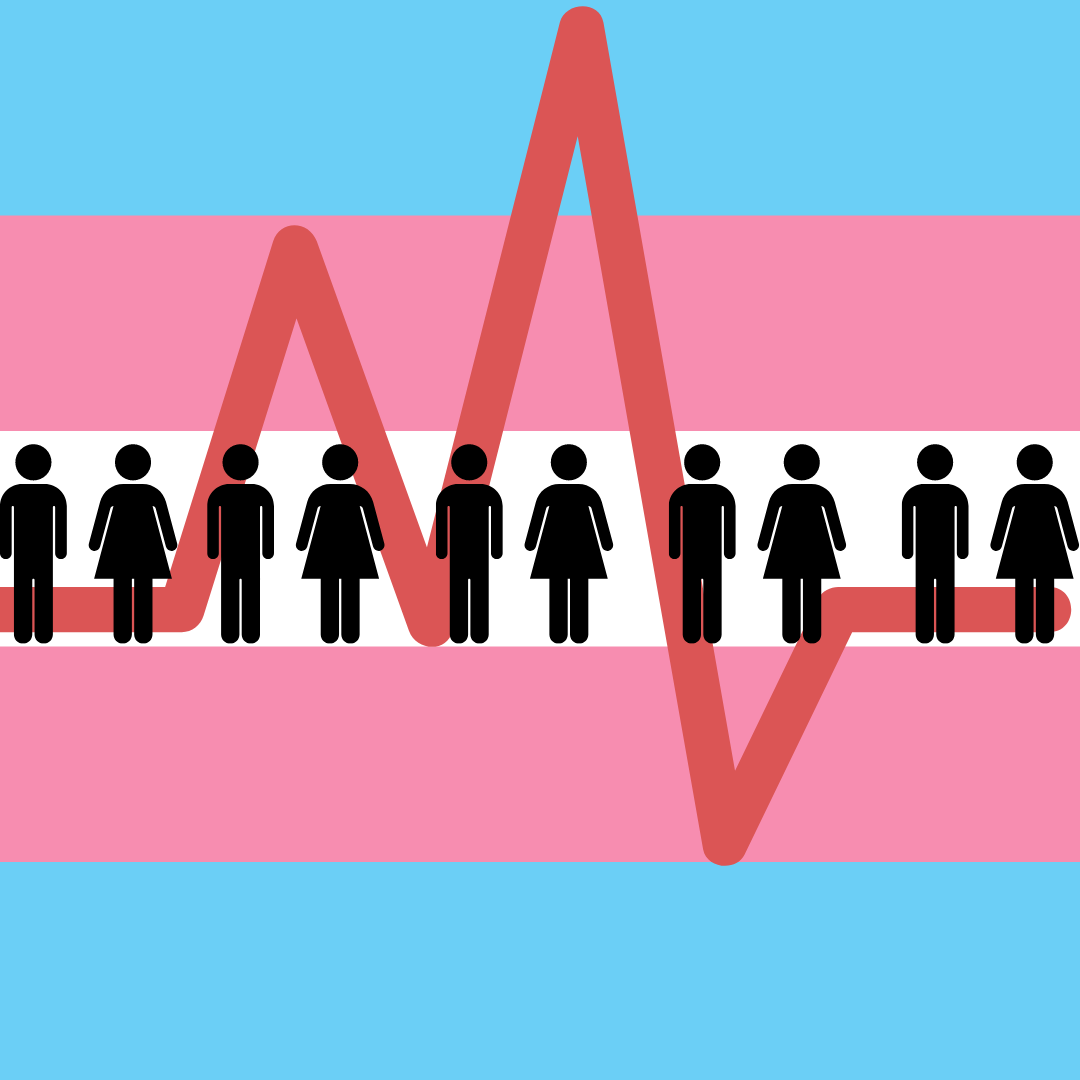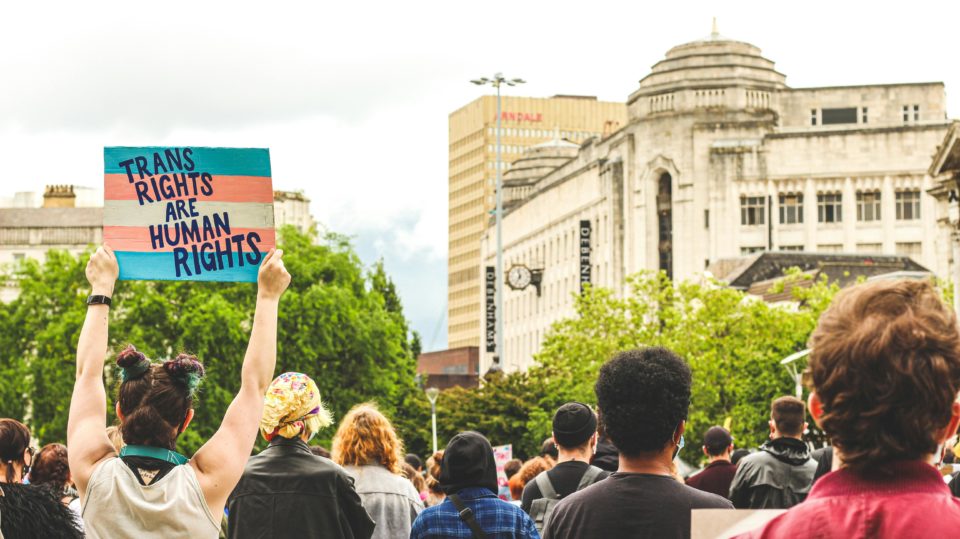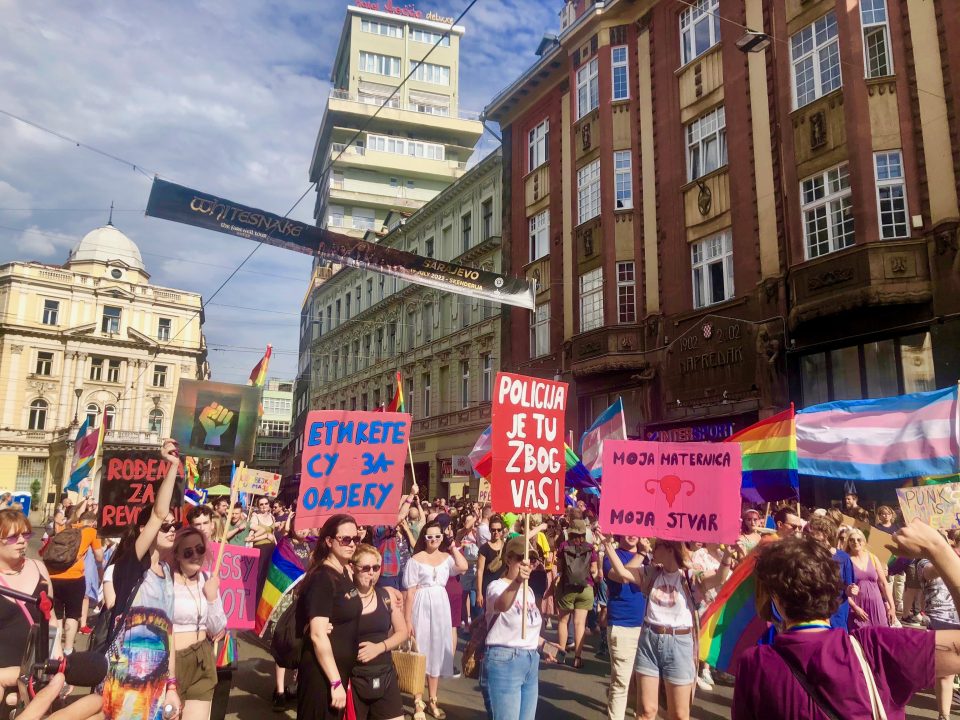
Trans people occupy a particularly precarious space in BiH in terms of social acceptance, legal recognition and healthcare access. The lack of protection, acceptance and support in Bosnia and Herzegovina is exemplified by the restrictions and limitations that individuals face when dealing with governmental institutions and medical professionals.
The lives of transgender people in Bosnia and Herzegovina in 2024 are filled with precariousness. On paper, it is possible to transition medically and legally, but in practice, these processes are fraught with pitfalls. Whilst legal gender recognition is accessible all across BiH, it has been described as vague and ineffective in practice (Vukas-Hasanbegović 2023). According to one of the leading NGOs working for queer and trans rights in BiH, Sarajevo Open Centar, the current legal texts imply that legal gender recognition can only be granted to individuals who have been through a complete medical transition. This practice clearly contradicts one’s right to self-determination and has already been criticized by the European Parliament (ILGA 2024). Due to this legislation, medical care for trans people in BiH is even more essential to gain basic rights in other areas of everyday life. Without legal documents that reflect one’s appearance and identification, trans people experience additional difficulties in accessing i.e. the housing or the job market. Although gender-affirming care is therefore all the more important in the Bosnian context, there is a lack of medical professionals in the country who have been sensitized to questions of gender identity and trained to perform the necessary medical interventions. The insufficiency of care and expertise in the field of gender-affirming medicine has resulted in many trans people seeking treatment outside of BiH such as in Serbia or Croatia.
Medical Care and Hardship
Gender-affirming care describes a broad spectrum of medical interventions and varies according to individual desire and identification. The situation in Bosnia and Herzegovina is complex. The country is divided into three political units: Republika Srpska (RS), Federation of Bosnia and Herzegovina (FBiH), and Brčko District. Since healthcare is not dealt with at a state level but rather at an entity level, each of these political units have their own legal frameworks and administrative structures. Due to this complicated administrative structure and the divergences between the RS and the Federation, it is often difficult for trans people to assess which of the necessary procedures are actually available in BiH and which need to be accessed abroad.
According to Delila Vukas-Hasabegović, program coordinator at the Sarajevo Open Centar (SOC), hormonal therapy, psychological counseling and different medical examinations are generally available in BiH, whilst any kind of surgical intervention is not. Health institutes attribute this deficit to a so-called lack of trained medical professionals, even though reports by SOC have questioned this given other services provided by state clinics that do not differ drastically from gender-affirming procedures such as mastectomies or top surgeries (Isić 2018). Delila Vukas-Hasanbegović also notes the inadequacy of those services that are currently available in BiH. While there is psychological counseling available in BiH, there is only a small number of psychologists that have been trained on gender identity issues, especially in rural areas. For this reason, the Sarajevo Open Centar launched an online educational program for BiH psychologists and psychotherapists in 2018. This program has successfully trained mental health professionals all across BiH on struggles relating to gender identity. Their program was later expanded to endocrinologists, gynecologists and neurologists. In spite of the many improvements that have been made, Vukas-Hasanbegović still emphasizes the general lack of trained medical professionals, such as endocrinologists, ‘maybe one or two in the whole country’, which impedes access to treatments such as hormone therapy.
Access to gender-affirming care is further restricted by the financial burden imposed upon transgender people seeking treatment. This is because ‘gender reassignment’ is not recognized as an essential medical service by the different health insurance institutes across Bosnia and Herzegovina and is therefore not covered by health insurance. So far, only some of the medical and psychological examinations that are needed prior to starting hormonal therapy are covered by insurance, no matter the diagnosis. Services that are solely dedicated to transitioning, such as hormonal therapy or surgical procedures, need to be paid for privately (Isić 2018). The cost of these services varies greatly depending on each individual’s transitional journey. Activist Liam Isić (2018) has compiled a detailed report for SOC on the cost of hormonal and surgical interventions for trans people in BiH. According to their report, one vial of testosterone alone costs 4.95 BAM (approximately 2.5 euros), which adds up to a much larger sum when keeping in mind that transitioning is a long-term process that might require life-long supplementation (ibid.). In their report, Isić also addresses the cost of surgeries abroad such as in Serbia or Croatia. There, surgeries such as metoidioplasty can cost up to 19,556 BAM (approximately 10,000€, (Isić 2018). These prices can create an unsustainable financial burden on individuals seeking gender-affirming care.

Legal Status and Administrative Issues
The legal situation in BiH is just as complicated to assess due to the complexity of its political and administrative structure. Since healthcare is not dealt with at a state level but rather at an entity level, each of the country’s three political units have their own legal frameworks and administrative structures. While the RS has a centralized government, the situation in the Federation is more complex, since cantonal and entity institutions share the responsibility for healthcare here. According to Vukas-Hasanbegović, this divergence is one of the biggest challenges for the political advancement of trans rights in BiH. NGOs advocating for trans rights in the Federation struggle with this administrative structure since there is no centralized institution responsible for changing the legal framework for accessing healthcare services for gender-affirming care.
Tragically, access to these restricted medical services appear to be a prerequisite for legal gender recognition across the country. According to an action plan that was adopted by the Council of Ministers of Bosnia and Herzegovina in 2022, it is possible for people to legally change their gender in official documents only if they have “completed” their medical transition (CMBiH 2022). These constraints are discriminatory and degrading because they deny trans people who cannot access or do not seek medical affirmation any official recognition of their respective identity.
Furthermore, it is not clearly defined at what point a transition is recognized as “completed”, which allows for even more restraining interpretations. Briefings by SOC have repeatedly criticized the current practice and called for the recognition of “life in a different gender identity” as a sufficient reason to legally change your gender (Pink Report 2024). Their demands are in line with international actors such as the European Parliament who have stated that this policy clearly violates the human right to self-determination.
It also appears to be at odds with anti-discriminatory laws that have been in place in BiH since 2003 and 2009. Whilst the 2003 Law on Gender Equality already prohibited “discrimination based on sexual orientation and gender” (ERA), it did not specifically cover all areas of life. However, the potential limitations of this law have since been addressed by the 2009 Law on Prohibition of Discrimination. This law also includes healthcare and public life (ibid.). Therefore, as of 2009, activists and NGOs arguing for trans rights have a clear legal basis they can refer to, even though they are faced with different interpretations of these laws.
Social acceptance and public perception
In the absence of a survey carried out by the Bosnian state or its constituent entities on the public perception of transgender or gender non-conforming people, it is up to the Sarajevo Open Centar to survey the population at regular intervals on LGBTQI issues in BiH. In its 2023 report, entitled ‘Acceptance from a Distance – Attitudes Towards Homosexual, Bisexual, Trans and Intersex people in Bosnia and Herzegovina’, SOC revealed nuanced attitudes towards transgender and gender non-conforming people and, above all, indecision on the part of those surveyed. This may reflect the lack of information on the subject as well as the lack of representation of transgender and gender non-conforming people in BiH.
20.7% of the 1023 respondents of the representative sample said they were in favor of the right of transgender people to change their civil status on the basis of self-determination, while 43.6% were opposed. Meanwhile, more than a third of respondents answered ‘I don’t know’. To the question ‘Do you think that the costs of medical gender reassignment should be covered by public health insurance for transgender people who have health insurance?’, 17.2% of respondents agreed, while 21.5% did not know, as the legislation in this area is fairly vague and therefore not well known to the general public.
The survey also reveals some consistent attitudes towards gender norms and trans identity. Only 15% of respondents agreed that it is acceptable for someone to have gender reassignment, while only 10% agreed with the statement ‘it is acceptable that a person dresses/behaves/speaks as someone of the opposite sex’. These results may be indicative of broadly anti-LGBTQI attitudes in Bosnia.

This public perception of transgender and gender non-conforming people has concrete implications for the legal and political challenges they face in Bosnia Herzegovina. Indeed, the public perception of medical transition as a ‘passing fancy’ fits within a hostile political environment in which politicians fail to consider trans rights (and more globally, LGBTQI rights) as an important issue, leaving anti-discrimination laws not enforced and therefore ineffective. . The public opposition expressed in the SOC survey to the reimbursement of gender-affirming healthcare comes against a backdrop of anti-trans political maneuvers in the RS: the 2023 amendment of the Mandatory Health Insurance Law in Republika Srpska aims at excluding gender-affirming healthcare from the reimbursement procedures.
Regional connections and disparities
Since gender-affirming surgery is still not available in BiH, many people seek medical care in other regional centers such as Belgrade or Zagreb. Belgrade in particular emerged as a regional medical hub when it was the capital of Yugoslavia. A medical team led by Dr. Sava Perović has been performing gender-affirming surgeries in Belgrade since the late 1980s (Vidić & Bilić 2022: 84). Dr. Perović founded this branch of medicine in the city and has called them ‘sex change operations’ ever since. Meanwhile, he and his team have repeatedly been accused of homophobia and abusive treatment by activists such as Agatha Milan Đurić (Đurić 2022: xi). Dr. Perović was known for his refusal of patients whom he considered ‘homosexuals’ after their desired transition (Vidić & Bilić 2022: 84). Today, there is still only one medical team performing these surgeries, although it is now led by Dr. Miroslav L. Đorđević. His team has effectively monopolized gender-affirming care in Serbia and turned it into a profitable business model (Ulićević & Brković 2022: 43).
As the cost of gender-affirming surgeries in Serbia is rather low for the international market, people from all over the world come here to access these services. While people with Serbian health insurance have to pay 40% of the total cost, non-citizens of Serbia have to pay the full price. Given the complexity of the various medical and administrative structures that Bosnians have to rely on due to the lack of services at home, intra-regional networks are particularly important for the LGBTQI community. Trans Mreza Balkan, a transnational organization focused on trans rights in Southeastern Europe, offers a great example of the value of these community networks. Trans Mreza Balkan is connected to various local organizations on the ground in BiH, such as SOC. Trans Mreza Balkan offers support and expertise to local NGOs and activists and provides information and contacts to community members in need. Dr. Aleksa Milanović, Program Director at Trans Mreza Balkan, emphasized the constructive cooperation with SOC. They also criticized the fact that there are hardly any active organizations in BiH that are exclusively dedicated to the advancement of trans rights. For this reason, BiH occupies a particularly complicated and precarious place for queer bodies in the post-Yugoslav space.
Access to healthcare, and specifically gender-affirming healthcare, is in conclusion fraught with difficulties for transgender people in Bosnia Herzegovina, and yet it is positioned as essential in order to access legal gender recognition. The high costs associated with this process and the lack of trained medical staff make it difficult to achieve the medical transition required for legal gender recognition. The legislative status framing this recognition is blurry enough. In addition, public opinion that is unfavorable or unaware of the issues faced by trans people reinforces hostile political discourse and, as a result, does not encourage positive legal change.
An important point to emphasize is that, apart from the connections that exist at a regional level in the Balkans, local organizations benefit from the support of international players such as the USA and the EU. This is often through USAID or the Council of Europe, which fund reports on the issue and provide symbolic support to organizations fighting for the rights of trans people in BiH. This support from foreign players for trans people’s rights could prove to be a powerful leverage tool. However, the prominence of these, mainly Western, actors, especially through project funding, can perpetuate neocolonial power structures and render the recipients dependent on foreign aid, while fuelling the far-right criticism in Bosnia that the fight for transgender rights is a product of foreign interference and an import of Western values.







